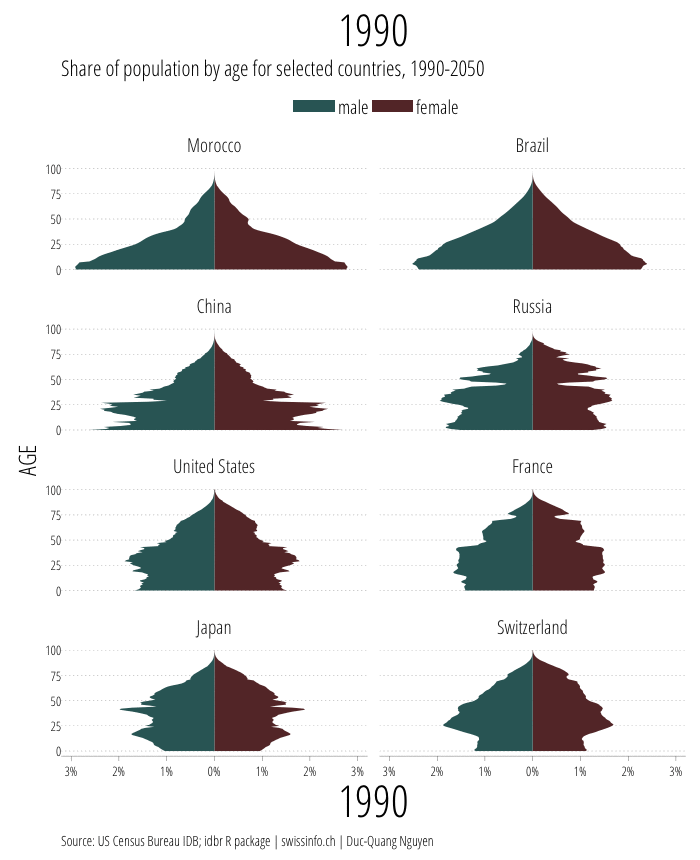
As Switzerland ages, the pension system gets stretched

For nearly 70 years, retirees in Switzerland have been guaranteed a decent pension through old age insurance. But data analysis shows that the existing system is having trouble adjusting to demographic developments.
2016 is an important year for the future of the Swiss old age insurance scheme. Parliament is in the midst of discussing the “Retirement 2020” project, and at the end of September, voters will have their say on a people’s initiative that would require a 10% increase in the amount that pensioners receive from the government.
A central point in pension reform is the raising of the retirement age for women to 65 years – on a par with men – from the current 64. However, the current age at which people actually retire often doesn’t reflect the legal requirement, as the following graphic shows. In Switzerland, the average man stops working at the age of 66.3 years.
The uncertainties that the Swiss old age pension system will have to deal with in the future are all due to demographic developments, as is also the case in many other countries. Society is ageing, life expectancies are rising, and premature death is less likely.

In 1948, the year the Swiss old age insurance scheme was introduced, there were more than seven employed people between 20 and 64 years of age for every pensioner. Today, that number has dropped to 3.4, and by the end of this century, there are expected to be just two workers per retired person. The ratio will especially plummet between 2020 and 2030, when most members of the generation known as the baby boomers will retire.
To date, the decrease in this so-called dependency ratio has not affected the state pension scheme’s finances, because increased productivity and higher wages have offset the impact. Whereas in 1950, 7.3 workers were needed to finance a monthly pension of CHF595 ($608) – the maximum at the time – the same can be achieved today with just 1.7 employed people.
Supporters of the people’s initiative to increase everyone’s pension by 10% write in their brochure that economic development will guarantee a more solvent state pension fund, allowing it to pay out higher amounts and withstand the coming demographic shift.
But parliament reached a different conclusion when debating the “Retirement 2020” legislation: the most likely scenario shows that “the pension fund’s finances will fall out of balance by 2020 and by the year 2030, there will be an annual funding gap of CHF8.3 billion”.
The following graphic shows the development of the state pension fund’s finances since its inception in 1948 and how the financial situation is set to develop without the proposed government reform. The difference between the money going in from workers’ salaries and the money going out in the form of pensions is illustrated in black.
Government calculations show that the reform being debated in parliament will not be able to address all of the pension scheme’s funding gaps. But it should be able to bring the deficit down from the foreseen CHF8.3 billion per year to just around CHF1 billion annually.
Immigration could also have an impact on the situation posed by Switzerland’s low birth rate and high life expectancy. Without the contribution of workers coming from other countries, the pension scheme would have been in the red since 2001, according to the government.
As the following graphic shows, more foreigners are currently of working age than Swiss people.
Is increasing the retirement age unavoidable given demographic developments in Switzerland? Or are there other solutions? Let us know your thoughts in the comments.
Translated by Veronica DeVore

In compliance with the JTI standards
More: SWI swissinfo.ch certified by the Journalism Trust Initiative






























You can find an overview of ongoing debates with our journalists here . Please join us!
If you want to start a conversation about a topic raised in this article or want to report factual errors, email us at english@swissinfo.ch.